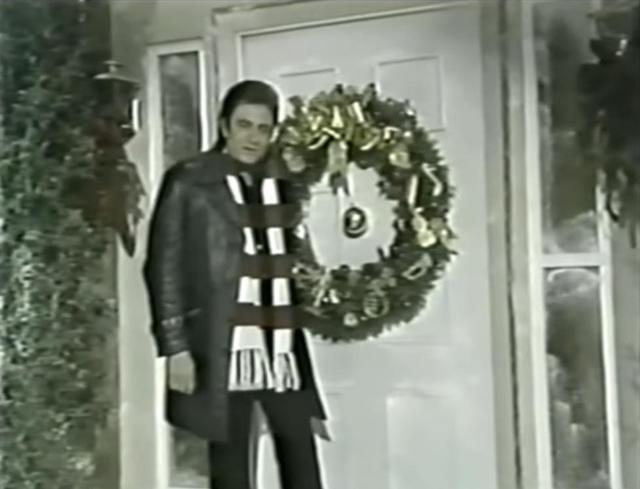
Seasons greetings from Johnny Cash. Come on in!
THE CLASSIC CHRISTMAS ALBUM
Johnny Cash
Legacy Recordings
Johnny Cash’s entry in Legacy Recordings’ Classic Christmas Album series is a representative sampling of the three Yule albums he recorded during his long tenure with Columbia Records, comprised as it is of interesting tracks from The Christmas Spirit (1963), The Johnny Cash Family Christmas (1972) and Classic Christmas (1980), with a preponderance coming from the ’63 and ’72 long players. Produced by Gregg Geller, who has done such outstanding work in bringing Cash rarities to market over the course of multiple volumes of the Bootleg series, can add another feather to his cap for the decisions he made in wading through the Man in Black’s seasonal outpourings. For all his well-publicized spiritual backsliding, Cash was a man strong in his Christian faith, and Christmas offered him an opportunity to express that faith in the most devout terms. Many of the songs Geller selected reference the Christ child’s birth and the hope of redemption and salvation He embodied as well as His legacy of peace and love. In short, family and faith are the major themes here, so if you’re looking for something ornery, better take it on down the line.

Johnny Cash reflects on ‘Christmas As I Knew It.’

‘I Heard the Bells on Christmas Day,’ Johnny Cash and June Carter Cash, from the Classic Christmas Album
The tone is struck at the outset with one of three stirring recitations on the disc, “Christmas As I Knew It,” from the Family Christmas album. Oddly enough, this tale of a Christmas when the penniless Cash family gave the gift of light and sustenance to another Dyess, Arkansas, family even more desperate than their own—in which Cash references his mother, brothers and sister Reba—was written by June Carter and Jan Howard. Like many of the other tracks here, the instrumental backing is spare—in this case, a soft, churchy piano courtesy Chuck Cochrane and a lone, twangy electric guitar that is likely Carl Perkins. From the same album comes a more jaunty and full-bodied effort when the assembled multitude (June, Anita and Mother Maybelle Carter, Perkins, W.S. Holland, Marshall Grant, Norman Blake, the Statler Brothers’ Lew DeWitt, et al.) breaks into a bluegrass-style strut on Tex Logan’s evergreen “Christmas Time’s A-Comin’,” which features a rousing group singalong, a clearly ebullient Cash and rustic, insistent banjo rolls throughout by the towering Blake. Following the opening salvo of four tunes from Family Christmas comes a trifecta of gems from his first seasonal long player, 1963’s The Christmas Spirit. These include “Blue Christmas” (the only the time on the album when the topic centers on romantic love) realized as a tear-stained pop-country tearjerker, with the Anita Kerr Singers adding smooth, plaintive harmony work over the basic band’s restrained backing; “Little Drummer Boy,’ in a spare, thumping arrangement over which Cash gives an assertive reading of the text in contrast to the piping harmony supplied by the Anita Kerr Singers; and a Cash original, “The Gifts They Gave,” a reverent performance documenting what each participant in and witness to the Christ child’s birth brought to the sacred night, starting with the donkey (“I carried the mother to Bethlehem town…”). Following this comes “King of Love,” by the Statlers’ Harold Reid, a hymn-like reflection on Christ’s life and legacy bolstered by the backing vocals of Harold Reid and Lew DeWitt and, for a fleeting few seconds, the haunting high soprano cry of Anita Carter, as unearthly a sound as ever emanated from a human being.

‘Blue Christmas,’ Johnny Cash, from the Classic Christmas Album
Several fine performances of traditional material not only maintain the album’s thematic unity but rank with Cash’s finest Christmas sides, including his moving take on the Wordsworth poem become Yuletide classic, “I Heard the Bells on Christmas Day” (nice support here from the Carter sisters); a rousing, horn-fueled celebration of the Christ child’s birth as referenced in “Joy to the World” (from Classic Christmas); a lovely, stirring treatment of “It Came Upon a Midnight Clear,” with the strings, woodwinds, carillon and mixed-gender backing vocals by the Bill Walker Orchestra and Chorus. From Family Christmas, an affecting group sing of “Silent Night” closes the disc on a moving note in a crisp two minutes-two seconds of soothing harmony when all the voices merge into one.
Johnny Cash, ‘The Christmas Guest,’ adapted from a poem by Helen Steiner Rice. Posted at YouTube by Andrew Cohen.

Johnny Cash & Family, the complete Christmas show from 1979 with guests Andy Kauffman, Tom T. Hall and Anne Murray.
Two recitations, and one that could be but is sung instead, serve as a prelude to the sanctity “Silent Night” offers as the end of this special journey. “Ringing the Bells for Jim,” another June Carter-Jan Howard co-write, is a soft shuffle of a ballad about a little girl ringing church bells at Christmas for her dying brother. “The Christmas Guest” (from Classic Christmas) is an oft-covered recitation (adapted from a poem by Helen Steiner Rice) recounting a vision a lonely man had of Christ coming to visit him on Christmas Day, and the hasty preparations he makes for his expected Christmas guest. There’s a twist, of course: three needy visitors come to his door seeking his help to get them on their way on Christmas Day, which the protagonist, named Conrad, is happy to provide, even as he worries, his heart “heavy and sad” over being misled by the Lord he serves. Beseeching Him in prayer, Conrad hears a voice rising in the silence around him, that of the Lord revealing that He did keep His word—“three times my shadow crossed your floor, three times I came to your lowly door”—a classic Cash spiritual parable. In his self-penned title track for The Christmas Spirit, a hymn-like recitation, Cash recounts vivid encounters with the spirit of the season in other parts of the world and how it links us all together, which in turn gives rise in him, when he awakes on Christmas morn, to a greater appreciation of the day’s greater import. “Ringing the Bells for Jim,” “The Christmas Guest” and “The Christmas Spirit” may be Cash at his most sentimental but they also represent a part of the artist that was fundamental to his sense of self, rooted as they are in the values the poor lad we met in “Christmas As I Knew It” learned and took to heart. “Silent Night” is merely a postscript here; the story takes place between “Christmas As I Knew It” and “The Christmas Spirit,” in its evocations of faith, charity and good will towards all and its embrace of family and friends–inseparable parts of his life’s equation.



